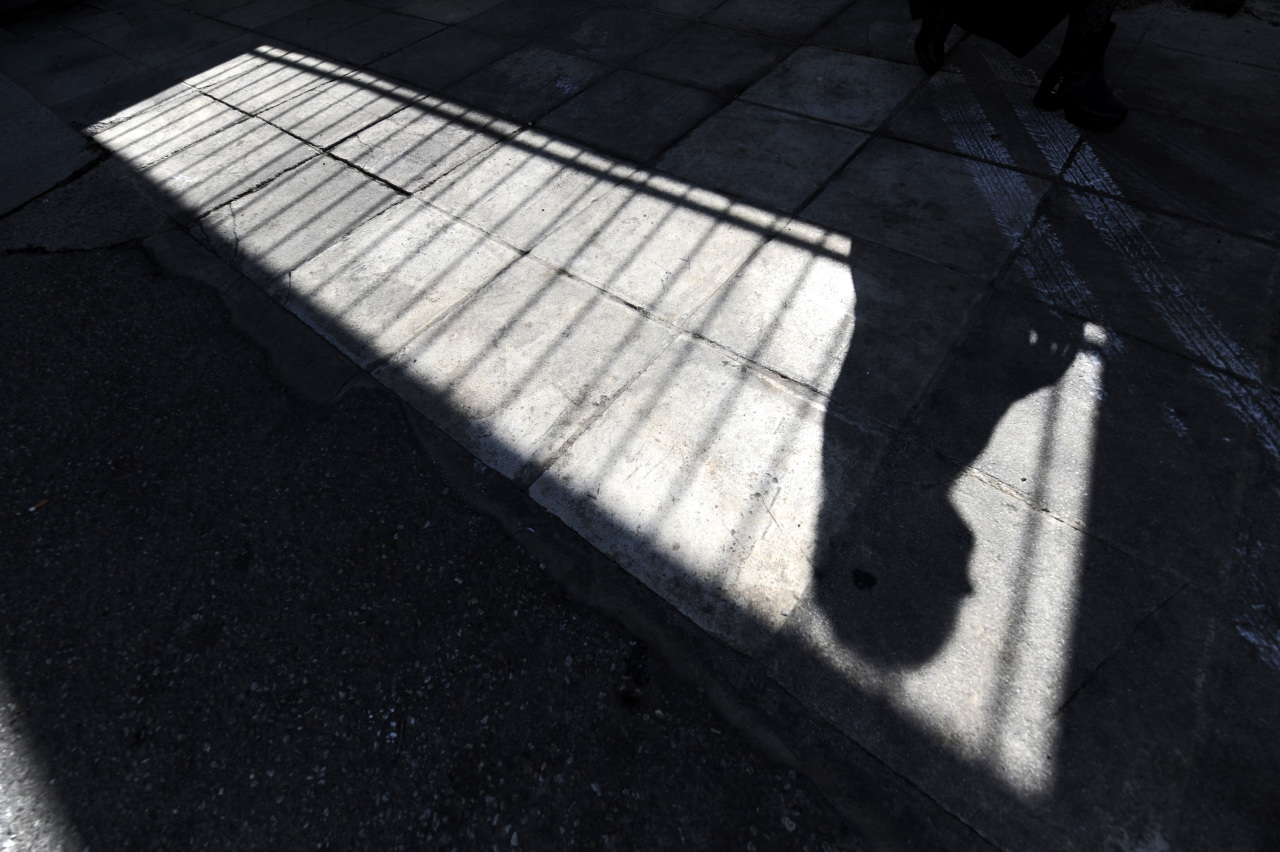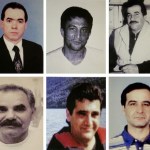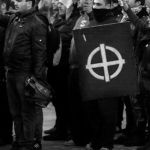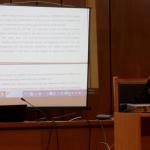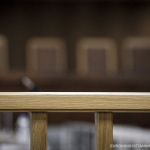21st Hearing, Women’s Section, Korydallos Prison, Athens, 13 October 2015
1. Court access
Hearings remain open to members of the public, provided they present their identity cards at the entrance. The courtroom was packed.
2. Presence and representation of the defendants
Eleven (11) defendants were present at the beginning of the hearing, while the absence of thirteen (13) was recorded. The remaining defendants were represented by their counsel.
3. Joint statement from the civil action
Antonis Antanasiotis (civil counsel for the PAME trade unionists) asked that a joint statement from the civil action be read out and placed on the court record. The statement concerns the court’s rejection of a request from the civil action for audiovisual equipment to be provided. The statement read as follows:
“In a previous hearing, the court rejected the civil action’s request that audiovisual equipment be made available to counsels wishing to screen videos, project photographs or play audio recordings in the courtroom while witnesses are being questioned. The aforementioned request was rejected by the court; as was a previous one requesting that the trial itself be recorded. They were rejected in spite of the fact that both measures aim at guaranteeing due process and at facilitating the discovery and elucidation of the truth. The civil action stated that the increasingly narrow interpretation and application of procedural rules obstructs the measures necessary to ensure due process and the interpretation of evidence, thus preventing a more thorough and efficient investigation of the facts of the case. Moreover, this attests to an attempt to limit the constitutional requirement that the trial be public.”
4. Pavlos Seirlis’ testimony (continued): cross-examination by the defence
Giorgos Roumpekas (counsel for Giorgos Roupakias and Margarita Mikelatou): You stated that your group of friends was the target and that you saw two women in the back seat of Roupakias’ car. How do you think Roupakias juggled entertaining two women with plans to commit murder?
Pavlos Seirlis: Your client has already admitted responsibility for the murder.
Presiding judge: Give us your opinion, if you can.
Seirlis: I have no opinion on the matter.
Roumpekas: You said that Roupakias was driving on the wrong side of the road. Was there traffic on the road?
Seirlis: I have already addressed that. I said that somehow, as if by magic, everything stopped in that moment. There was no traffic.
Roumpekas: Would a professional killer drive in the wrong lane knowing there was a chance he might get stuck?
Seirlis: I refuse to answer.
Roumpekas: If it were, as you insist, an organised crime, would he have have driven down the wrong side of the road? Would he have used a knife as a weapon? Would he have risked physical contact with a stronger man?
Judge: Next question! Do you have any claims regarding self-defence or something of the sort?
Roumpekas: The witness did not see the murder himself . We have to circle around the issue.
Judge: And go where? Please limit your allegations.
Roumpekas: Given the witness did not see the fight, my questions have to move around the issue. In my opinion, the witness is not credible. Can we rule out that this was a chance encounter rather than a premeditated attack?
Judge: Next question!
Roumpekas: Pavlos Fyssas was stabbed three times: once in the thigh. Now, why would a professional killer wound the victim in the thigh?
Seirlis: Just for the femoral artery.
Roumpekas: Had Pavlos Fyssas consumed a lot of alcohol that night?
Seirlis: Not while we were together. I don’t know how much he had to drink earlier.
Roumpekas: Did he seem sober?
Seirlis: Yes, he seemed sober.
Roumpekas: You stated that he said, “they caught the little ones, run” and laughed. Why did he laugh?
Seirlis: It hadn’t crossed his mind that something like this would happen. He was just thinking about the fear and the danger. That doesn’t mean he was drunk.
Judge: Counsel, the phrase was “he smiled at me”. What is your question?
Roumpekas: He couldn’t understand what was going on because he was drunk.
Judge: Next question!
Roumpekas: What was the defendant’s emotional state at the police station? Did he look shaken?
Seirlis: He sent text messages. I’ve already told you all this. When a man starts chatting and handing out cigarettes, he probably isn’t all that shaken.
Roumpekas: When you found out that Pavlos Fyssas had “perished”, did you say it out loud? Did Roupakias hear it? Was he nervous or calm?
Seirlis: He asked to be moved to a different room.
Roumpekas: Pavlos Fyssas was called killah; what does that mean?
Seirlis: It means “killah past”: I kill my past.
Roumpekas: Had Pavlos Fyssas got into a fight before?
Seirlis: No. I’ve already said this.
***
M. Papadimitriou (counsel for Giorgos Stampelos): In your statement, you said that you saw the silver car while you were hiding in a ground-floor parking lot beneath an apartment block.
Seirlis: Yes, out of the corner of my eye. I have already spoken about this.
Papadimitriou: When you saw the car, around how many people were on Tsaldari street?
Seirlis: I couldn’t guess.
***
Christoforos Tsagkas (counsel for Giorgos Germenis and Anastasios Michalaros): Had you arranged to continue your evening elsewhere?
Seirlis: In a friend’s bar in Korydallos. It was called Boukiraki. It’s closed now.
Tsagkas: Did you have to work the following day? What time?
Seirlis: I had to work the evening shift.
Tsagkas: Did Fyssas go to Koralli on foot or by car?
Seirlis: I don’t know.
Tsagkas: How were you planning to get to the next bar?
Seirlis: With my car.
Tsagkas: There were four of you already; how could you fit three more?
Seirlis: Some people said they wouldn’t be coming with us because they had to work the next day.
Tsagkas: What did you see when they started chasing you?
Judge: The witness has already described it. What specifically do you want to know?
Tsagkas: What did you see on the corner of Tsaldari and Kefallinias streets?
Judge: What exactly do you want from him? Soon you’ll be asking him to describe the weather that night!
Seirlis: I’ve already talked about it. I saw people with helmets, sticks, bats.
Judge: Were the people you saw in the photographs among the assailants?
Seirlis: I recognise a couple of them.
Tsagkas: Did you stop running at any point? If so, for how long?
Seirlis: I stopped for a while to catch my breath; then they started chasing us on motorbikes and I started running again.
***
D. Bonis (counsel for Leon Tsalikis): How many people were in your group at the bar before you went to Koralli?
Seirlis: I’ve told you: ten.
Bonis: Did you all know each other?
Seirlis: Some people were acquaintances rather than friends.
Bonis: And how did you arrange to watch the game there together if you weren’t friends?
Seirlis: Through mutual friends; I can’t remember the degrees of separation anymore.
Bonis: You said you spoke to Pavlos Fyssas in the afternoon and you arranged to watch the match together. Why did you end up watching it separately?
Seirlis: I have already answered that question. We didn’t organise it properly. Then we spoke again in the evening and we decided to move on to where he was.
Bonis: Who was in the initial group of friends? Melachrinopoulos, Kontonikolas? In his statement, Kontonikolas says …
Judge: Not like that. What is your client’s position?
Bonis: We are not convinced that the group was in a different bar and was then called to join the others in Koralli.
Seirlis: It took two phone calls to arrange it.
Bonis: How many Golden Dawn members were in Koralli?
Seirlis: I told you: three.
The judge asked the counsel not to repeat questions that were asked at the previous hearing.
Bonis: Do you remember if Tsalikis was wearing combats or other clothes?
Seirlis: He was wearing other clothes.
Bonis: Were they already riled up or did that happen when you arrived?
Seirlis: I don’t know what happened before I arrived. I’m telling you what I saw when I got there.
Bonis: Why did this intermediary come to you first?
Seirlis: First, he was with his pals; then he came to us.
***
A. Mammis (counsel for Nikolaos Tsorvas): Tell me, why would seven people get up and leave their table to go somewhere else to meet three people and run the risk of finding nowhere to sit?
Seirlis: I told you we spoke on the phone. There was more space in Koralli.
Mammis: How far from Koralli did you start running?
Seirlis: The corner of Kefallinias and Tsaldari streets is about 100 meters away from the bar.
Mammis: How much time elapsed between your leaving the bar and your starting to run?
Seirlis: Fifteen minutes.
Mammis: Can you give us a reasonable explanation for why it took you 15 minutes to walk 100 meters?
Seirlis: I told you. The intermediary stalled us. Then we walked on slowly and put our friends in a cab. We were moving slowly, we didn’t want to provoke anyone.
The judge intervened to say that all this had been discussed. She wondered what the purpose of the questions was.
***
Dimitra Velentza (counsel for Aristotelis Chrysafitis): You’ve said different things in your two testimonies. Were the people you saw later carrying bats and beams or not?
Seirlis: I told you earlier: yes.
Velentza: In your first testimony, you said they were carrying helmets and wearing black clothes.
Seirlis: I was exhausted. It was ten hours after my friend had died. I was terrified over the following days. I even had trouble going to Piraeus to testify for a second time.
Velentza: The witness remembered their beards, but not their bats?
The judge asked the counsel to move on.
Velentza: In what direction was the taxi going?
Seirlis: Towards Salaminos avenue.
Velentza: Was there traffic in that lane?
Seirlis: There was some traffic then, but none when the car stopped in the opposite lane. The silver car got there after we had put our sick friend in the cab. It stopped, the driver asked for directions, we answered and crossed to the other pavement. The taxi went off and a motorcycle police unit showed up, followed by another one.
Velentza: So the policemen were close by. Did they look at you?
Seirlis: Yes, but they moved in the direction of Kefallinias street.
Velentza: When the car stopped, did you notice the driver?
Seirlis: I saw him, but my attention was focused on the back seat.
Velentza: You said he looked at you intently and asked for Kefallinias street. Was he hidden? Did he have tinted windows?
Judge: Counsel, would he have asked for directions through closed tinted windows?
***
G. Michalolias (counsel for Dimitris Koukoutsis): You’ve mentioned some books by Golden Dawn; can you name a few?
Seirlis: I don’t remember their titles. There are books about Hitler in the organisation’s newspaper.
Michalolias: Why do you talk about the military structure of Golden Dawn?
Seirlis: I have seen videos on YouTube in which people give out military orders etc.
Michalolias: You said that Golden Dawn is an organisation of madmen. Do you know if any of the men there that night knew that the victim was ideologically opposed to Golden Dawn?
Seirlis: I don’t know. I heard a phone call between Kasidiaris and someone I don’t know in which he refers to Pavlos as a “bastard”.
Some defence counsels asked for details of the video so that they can confirm its authenticity.
Seirlis: I saw it on Facebook. I opened something someone had posted. But I’ve since closed my account because I kept receiving threatening messages.
***
Alexandros Alexiadis (counsel for Ioannis Lagos): What evidence in the case file tells you that they received their orders from Lagos?
Seirlis: I’ve seen a video of it on YouTube. They were planning to go to a church and stage an attack.
Alexiadis: Did they carry it out? If not, how can you prove that my client ordered it.
Judge: He inferred it from the video. He already told you that he doesn’t know if the attack was carried out.
Alexiadis: The witness is under oath. I can accept exaggeration from the Fyssas family, but not from a witness under oath. We’re being tried by the media here as well.
Judge: Questions, please!
Alexiadis read out an excerpt from a conversation between Lagos and Patelis conducted a few minutes after the murder, at 6.51am.
Thanasis Kampagiannis (civil counsel for the Egyptian fishermen): “Your honour, is that a few minutes after the murder?”
Alexiadis: You said that there was no dispute between Fyssas and Golden Dawn. What motivation would an MP have to order the crime?
Magda Fyssa (from the public gallery): He will tell you himself … He is not the deceased one; he’s the murdered one.
***
Konstantina Poulia Poulias (counsel for Thomas Marias): What did the 20–30 people involved in the attack do exactly?
Seirlis: I told you I can’t know exactly what each of them did. I saw a mob coming at us. Some of them hit Pavlos, others hit Melachrinopoulos. I didn’t count them. You do realise I was being chased, don’t you?
Judge: Could any of them simply have been there by chance?
Seirlis: Of course not.
***
Nikos Antoniadis (counsel for Nikos Michaloliakos): You said there was some contact between Lagos and Michaloliakos. Do you get any of this from anywhere other than the mass media?
Seirlis: I’ve seen things on the internet.
***
P. Mentzelopoulos (counsel for Theoni Skarpeli): Where were you standing relative to Roupakias’ car when he stopped to ask for directions?
Seirlis: On the driver’s side, a little further back.
Mentzelopoulos: You said in your testimony that the defendant was bald, then you said he had a buzz-cut and then you said his hair was a good two-inches long. Which one is it?
Seirlis: “Bald” is a health condition; “bald fade” is a haircut. I said the latter.
Mentzelopoulos: Was Baxevanaki [Aggos’ wife] sitting behind Roupakias or not?
Seirlis: The woman with the black hair. I’ve said it already.
5. Counsels’ statements and requests regarding Seirlis’ testimony (according to article 358 of the criminal code)
Giorgos Sotiropoulos (counsel for Ioannis Aggos) asked the witness to state whether he recognises the individual to whom he referred in his testimony and who was present in the courtroom. The individual in question was initially among the accused but was not charged. Mentzelopoulos asked that the witness be shown a photograph of the two women so that he could confirm whether they were the same women he saw in the back of Roupakias’ car. The judge pointed out that the photo was almost too dark to distinguish anything and asked that the request be entered in the court record and returned to later.
Takis Zotos (civil counsel for the Egyptian fishermen) pointed out that two crucial facts have emerged from the testimony. The first is that it was a planned attack; the second is that, in the days following the assault, there was a pervasive sense of fear, given the witness had to be escorted to give testimony.
Thanasis Kampagiannis (for the Egyptian fishermen): “The witness is precise, he shed light on the facts as he knows them, in spite of the fact that he was faced with surreptitious questions such as those posed by Mr Alexiadis on the matter of the communication between Pavlos and his friends. The counsel attempted to turn the victims into perpetrators. It seems that there is a general attempt to disassociate Lagos from Patelis, given he suggested that Patelis ‘says whatever he feels like’.”
Kostas Papadakis (for the fishermen): “To begin with, it is clear that there was no confrontation between Fyssas and the others before the assault. This goes to show that Fyssas was a premeditated target. A second point is that the assailants did not want to cause a ruckus in the bar they liked to frequent.”
N. Kontovazenitis (counsel for Anastasios Anadiotis) requested to submit a document: the license for the scooter mentioned by the witness. Mr Anadiotis maintains that the witness is not referring to the same vehicle.
Defence counsels Vasilis Oplantzakis (for Ioannis Kazantzoglou), Dimitra Velentza (Elpidoforos Kalaritis), Christoforos Tsagkas (Anasatios Michalaros), Dimitris Gavelas (Giorgos Patelis), as well as Giorgos Roumpekas, M. Papadimitriou, D. Bonis, Alexandros Alexiadis, Nikos Antoniadis and N. Mentezelopoulos took the floor and issued a statement questioning the witnesses’ credibility.
They supported their claim by pointing out, among other things, that the women the witness recognised in Roupakias’ car are not defendants in the case; that the friends arranged to watch the match together despite the fact that one of them did not seem interested in it; that half-time was at 10.30pm and it is thus unlikely that the groups could have met up at 11.05pm; that it would not have been rational for seven people to leave a venue in order to meet up with three others. They also said would it have been impossible for all of the people involved to fit into the available cars. Moreover, it seemed strange that someone would note the passengers sitting in the back seat of a car rather than the driver.
6. Joint statement from the civil action regarding the trial venue
Kostas Papadakis (counsel for the Egyptian fishermen) requested permission to read out a statement and that it be placed on the court record: “We, the civil action in the Golden Dawn trial, denounce the failure to move the trial from Korydallos to the conference hall of Athens Appeals Court, even though the required changes to the venue, such as cordoning it off from the rest of the building and establishing a separate entrance, have been made. And yet, rather than the making the venue available for the Golden Dawn trial, as was repeatedly requested by the civil action, by hundreds of activist organisations, by the local community of Korydallos and by the presiding judge herself, the justice minster, under decision no. 73774/07.10.2015 (Government Gazette B 2160/07.10.2015), declared that the hall would be used for the trial of drug smugglers (Noor One), thus preventing the transfer of the Golden Dawn trial. It is blatantly arbitrary and shows disregard for all the parties listed above. Moreover, it demonstrates that the government wishes to marginalise the trial and to ensure that it receives as little publicity as possible. Such measures demonstrate contempt for the court itself. We remain determined in our demand that the trial be moved from Korydallos to the conference hall of Athens Appeals Court and ask all those involved to ensure that our demand is met.
7. Prosecutor’s motion and court’s decision regarding applications from the defence counsel
The prosecutor proposed that the court accept the request from Giorgos Sotiropoulos (counsel for Ioannis Aggos) regarding the identification by the witness of a third party. She suggested that the other two requests be denied, given evidence should not be presented at this stage and, moreover, the photographs in question are photocopies; the faces depicted are blurred and difficult to see. The court accepted the prosecutor’s motion. A woman entered the courtroom and the witness was asked whether he recognised her. He said he did; she was one of the two women seated in the back seat of Roupakias’ car – specifically, behind the driver’s seat. He insisted that he was sure of it. The woman stated her name as Konstantina Baxevanaki. According to Mr Sotiropoulos, the defence’s position is that there were no other passengers in Roupakias’ car. His reasoning was that “Ms Baksevanaki is Ioannis Aggos’ wife. They live a few meters away from Kefallinias street. If she had been in the car, Roupakias would not have needed to ask a stranger for directions; Ms Baxevanaki would have told him where to go.”
8. Testimony of eyewitness Giorgos Rotas
The witness approached the stand asking that no pictures be taken of him. After being sworn in, he began his evidence.
“I have been a policeman since the end of 2011. I serve in Piraeus, in the Dias motorcycle police unit, and I live in Nikea. That night I was with three colleagues when we got a call from the station at around 11.55pm. We were told that 50 people with clubs were moving towards the Koralli bar, at the junction of Ifigenias and Tsaldari streets. We were in Perama, on Dimokratias avenue, near the town hall, 7km away from the scene. We were on bikes. I was sitting on the back and Koliousis was the driver. We were at the scene in 2–4 minutes. We didn’t get another call from the station. When we got to Tsaldari street, we met another Dias unit from Keratsisni, so another four colleagues. They were driving down Tsaldari street, from Lambraki street towards Salaminos avenue. The Keratsini unit stopped at the intersection with Pavlou Mela street. Koralli is on the corner of Mela and Kefallinias streets. There were parked cars on the right and one the left. We saw lots of people on Mela street, broken up into small groups moving towards Xanthou street. There were around 50 of them; many of them were carrying helmets. They had buzz-cuts, were dressed in black, were carrying bats and helmets; none of them was wearing a hood. We realised they were Golden Dawners. In front of them – in front of Koralli – there were five or six people. There was nothing peculiar about them and they weren’t holding anything. Tsaldari street was full of people – likely passersby. We stopped there, the first unit first. Officer Tsolakidis asked Hatzistamatis, a prison officer, what was going on. He said that Golden Dawners were having a verbal altercation with people from the “known scene”. When we got there, no one had been injured. Tsolakidis radioed the station and kept Hatzistamatis’ details. It was obvious that the Golden Dawners were there to make trouble. They looked at us strangely and asked us why we were there. Then a group of 20–30 people on Mela street started shouting and running. They turned into Kefallinias street and moved towards Tsaldari street. We started following them, shouting at them to stop.”
Judge: Where were those five as the others were running?
Rotas: I didn’t see them do anything.
Judge: What triggered the 20–30 people to run?
Rotas: I don’t know. I didn’t see anything. They were cursing and shouting, “We will fuck you up” and “get them” and running towards Kefallinias street. We couldn’t see if they were chasing anyone in particular.
Judge: Where did they stop?
Rotas: When we got to Tsaldari street and turned left, we saw something had happened. There were 3–5 people there who probably weren’t part of the mob on Mela street – how would they have got there so quickly? I saw them beating each other 15–20 meters away. They were wearing black shirts. We couldn’t see who was beating whom. We moved closer and saw Fyssas and Roupakias in a scuffle. The others started to run away. When we got there, the two of them broke it up. My colleagues, Diligiannis and Legatou, went to Fyssas and I saw Roupakias move towards his car.
Judge: Couldn’t you have got there in time for the fight?
Rotas: No. We didn’t see the knife. It was far away, but we were heading in that direction anyway. So I saw Roupakias head towards his car. Fyssas shouted, “He stabbed me.” I told Roupakias to come back and I frisked him. I saw the knife on the ground in front of the left wheel of the car, which he had parked on the wrong side of the road.
Judge: Were there people around when you arrested him?
Rotas: When we frisked him there were some people around: probably the people who were running away. Others were running away because they saw we’d caught him.
Judge: Were you afraid?
Rotas: Yes. I’m not immortal.
Judge: Did you drive him to the station?
Rotas: More officers arrived to bring him in. They bagged the knife. I asked him why he stabbed Fyssas. He said, “because he hit one of my guys”.
Judge: How much time passed from when you saw the fight to when you actually got there?
Rotas: A few seconds; it was 10–20 meters away.
Judge: How many people were in that mob on Tsaldari street? Were they hitting each other?
Rotas: There were 4–5 people. I saw arms and legs; I couldn’t make out what was going on exactly.
Judge: Do you recognise any of the defendants?
Rotas: I didn’t recognise anyone in my earlier testimony. Their faces look familiar but I don’t know if it’s from that night or if I saw them at other Golden Dawn events. I don’t know any of the defendants here today.
Judge: What do you know about other Golden Dawn events?
Rotas: There was a Golden Dawn demonstration once and we were told to follow it from behind and monitor where it was going. I haven’t been at any other events of theirs. I just see stuff on TV.
Judge: Besides what you saw, do you know anything about the organisation? Is there a hierarchy? Does someone hand out orders?
Rotas: I don’t know.
Judge: They have been accused of serious crimes; do you know anything about them?
Rotas: I heard about the fishermen, Luqman and the PAME trade unionists.
Judge: Do you know anything about the organisation’s local branch in Nikea?
Rotas: No.
Judge: Did you hear of Golden Dawn demos in that area?
Rotas: I heard they destroyed Fyssas’ monument.
Judge: Is it usual for you to see men gather on the street in uniform with objects in their hands?
Rotas: I’ve seen them demonstrate on TV. We used to pass by the party’s offices on Kaisarias street when we were on patrol in that area and we saw them.
Judge: Do you know if some clash or conflict preceded the attack?
Rotas: I don’t know.
Judge: Were there more arrests besides Roupakias?
Rotas: My unit didn’t arrest anyone else. We called an ambulance and a lot of policemen gathered there. We got a call from the station about more people on Kefallinias street and we started moving towards there. The station told us to detain the people who were running – the Golden Dawners were running out of breath.
Judge: In your testimony, you said that you searched for witnesses.
Rotas: There was a girl at the station later. No one else approached me. I don’t know about my colleagues. Everyone I asked answered, “I just got here.”
Judge: Did any of Fyssas’ friends show up?
Rotas: His girlfriend and a friend of his who took his shirt off. Then another girl showed up and said she was his cousin.
Judge: Was there fighting outside the bar?
Rotas: The Golden Dawners on Mela street were shouting and exchanging looks.
Judge: What did Hatzistamatis say to you?
Rotas: He said that there was a fight between Golden Dawners and some people from the “known space”. At least that’s how Tsolakidis relayed it to us.
Judge: So the people on Mela street were not the same as the people involved in the incident later?
Rotas: I don’t think they could have got there before us.
Prosecutor: You said you saw 50 people. Were they being led by anyone? Were they coordinated?
Rotas: They weren’t in formation. I didn’t notice anyone giving them orders.
Prosecutor: What exactly did Hatzistamatis do and how did he get there?
Rotas: I don’t know.
Prosecutor: Were Fyssas’ friends not there when he was murdered?
Rotas: No. His girlfriend showed up right after he was stabbed.
Prosecutor: Did you talk?
Rotas: No. She didn’t talk to me.
Prosecutor: Did Legatou say anything? That “no, not with knives”?
Rotas: I didn’t hear her say anything like that.
Deputy prosecutor: What did you see at the scene of the fight?
Rotas: As I approached, the others started to run, leaving just the two of them.
Deputy prosecutor: Were the people who started running away with Roupakias?
Rotas: I would assume so. Why else would Fyssas’ friends have run away?
Deputy prosecutor: Could Roupakias’ friends have prevented the murder?
Rotas: Yes and no. If they knew he was on his way to kill someone, they could have stopped him. But probably not during the fight itself, once he had taken out the knife.
Deputy prosecutor: Did you hear them say anything to him?
Rotas: Not in that moment.
Deputy prosecutor: How far away was his car? Was the engine running?
Rotas: It was parked on the pavement, 3–4 meters away. I can’t remember about the engine.
Deputy prosecutor: How did you determine whether to arrest someone? What were the criteria?
Rotas: We were ordered to arrest all the Golden Dawners we saw running, dressed in black.
Judge: Were there other people in the car?
Rotas: When we got him out of it, it was empty.
Judge: Did he say anything to you?
Rotas: He looked confused when we told him to get out of the car.
Prosecutor: What were those 50 people shouting? “We’re going to kill you”?
Rotas: I personally did not hear that.
Other judge (member of the bench): Were those 50 people aware of your presence?
Rotas: Yes.
Other judge: And why didn’t they run away? Does that seem normal to you?
Rotas: No.
Other judge: Did anyone tell you to go there because there was a fight going on?
Rotas: No. No one came up to me.
Other judge: Did you see anyone else get out of Roupakias’ car? Did anyone try to prevent his arrest?
Rotas: No.
Other judge: Could you have prevented the murder?
Rotas: No, we couldn’t have done anything else.
Here, Andreas Tzelis, counsel for the Fyssas family, asked the court to bring the hearing to a close, given participants were beginning to get tired and so that there would be no interruptions in the civil counsels’ questioning of the witness. Other civil counsels agreed; defence counsels asked that the hearing continue for another half hour.
The court was adjourned to 15 October, when Giorgos Rotas will continue his testimony. Before the hearing ended, the presiding judge announced that two more hearings would be scheduled for the following month (13 and 23 November).

